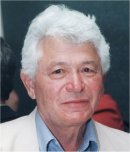|
||||||||||||||
|
Plenary
Lecture
Abstract: We proposed and developed a series of
fluorescent methods for analysis and investigation of
biological systems with a view of future
biotechnological and biomedical applications. The
methods we describe have been built upon several
photochemical and photophysics phenomena including
fluorescence quenching, photochrome photoisomerization,
and singlet-singlet and triplet-triplet energy transfer
[1]. Three new types of molecular probes have been
developed and employed for such studies: 1) dual
fluorophore-nitroxide compounds [2-11].
fluorescent-photochrome molecules [12-18], super
molecules containing both fluorescent and fluorescent
quenching segments [19]. The fluorescence properties of
the new probes were intensively exploited for several
practical applications including a real time analysis of
antioxidants, nitric oxide, superoxide, reactive
radicals, trinitrotoluene and metal ions in picomolar
concentration scale, investigation of molecular dynamics
(fluidity) of biomembranes in a wide range
characteristic times from seconds to nanoseconds, and
characterization of surface systems. Owning high
sensitivity, simplicity, availability of fluorescence
techniques, these methods can be widely employed using
standard fluorescent techniques and are potentially
adaptable to fibrooptic sensoring and focal microscopy.
|
|
|||||||||||||
|
|
|
|
||||||||||||
| copyright - designed by WSEAS | ||||||||||||||
